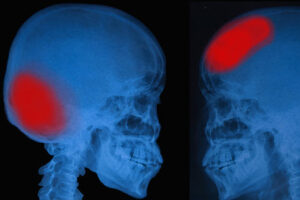Traumatic Brain Injuries & Personal Injury Cases

The idea of traumatic brain injury (TBI) frightens many people, most of all because they occur much more often than people believe. While seeking compensation for medical bills or other losses will not replace what you may have lost post-TBI, it can help cover expenses that you may need to incur in order to help you get your life back on track.
Common Causes & Symptoms
Statistics from the University of Florida Health estimate approximately 1.4 million new TBIs per year, with approximately 50,000 proving fatal. The leading causes of TBIs are motor vehicle accidents, violent crime, and falls. Head trauma is actually the leading cause of death for people under 40, even though these types of injuries are often associated with the elderly in the public consciousness. While the elderly might be more physically frail, they generally may not wind up in situations where the likelihood of TBIs are common, aside from having a fall at home.
Visible symptoms of a TBI will differ depending on its severity, which can make it very difficult to diagnose. However, even a so-called “mild” TBI is still a brain injury, and thus it is highly recommended to seek medical treatment as quickly as possible after an accident or other blunt trauma to the head. There are certain symptoms that are seen as particularly dire, such as slurred speech, memory problems, or inability to taste or smell, but every brain injury is serious.
Proving Liability
In order to hold someone liable for your traumatic brain injury at trial, you must prove first that one actually occurred, and that the defendant’s conduct caused it. In order to establish the existence of a TBI, the opinion of an expert witness is usually required. Once it can be established that you have a demonstrable injury, you and your attorney can focus on showing that the defendant’s negligence caused your harm.
Keep in mind that as long as you can establish that the defendant failed to exercise reasonable care and that failure caused your injuries, you have a good chance at recovery. This is true even if you are found to have been partially responsible for your own injuries, as Florida observes a doctrine called comparative fault. Comparative fault holds, at least in Florida, that damage awards can be reduced by the percentage of plaintiff’s fault, but recovery is not barred. For example, if you are found to be 20 percent at fault for your own injury, you may still recover, but any amount you get would be lowered by 20 percent.
Contact An Orlando Brain Injury Lawyer
Recovering after a traumatic brain injury requires all your focus, so having an attorney on your side who can handle the details of bringing suit on your behalf can make all the difference. The Orlando brain injury attorneys at the Hornsby Law Group are happy to try and assist you with your case. Contact our offices today for a free consultation.
Resource:
ufhealth.org/traumatic-brain-injury